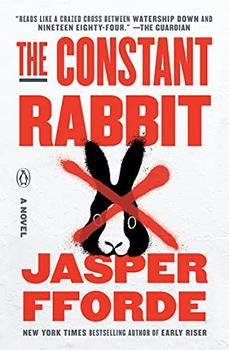Summary | Excerpt | Reviews | Beyond the Book | Read-Alikes | Genres & Themes | Author Bio

This article relates to The Constant Rabbit
 Jasper Fforde's novel The Constant Rabbit is a not-so-thinly-veiled allegory of racism and xenophobia that takes place in an alternate version of the United Kingdom. The governing party in the book is the UK Anti-Rabbit Party (UKARP), led by Nigel Smethwick, who seems to be based on Nigel Farage, the former leader of the UK Independence Party (UKIP). While the novel is absurd and fantastical in its depiction of discrimination against anthropomorphic rabbits, it also references the rise of right-wing politics in the UK in recent years.
Jasper Fforde's novel The Constant Rabbit is a not-so-thinly-veiled allegory of racism and xenophobia that takes place in an alternate version of the United Kingdom. The governing party in the book is the UK Anti-Rabbit Party (UKARP), led by Nigel Smethwick, who seems to be based on Nigel Farage, the former leader of the UK Independence Party (UKIP). While the novel is absurd and fantastical in its depiction of discrimination against anthropomorphic rabbits, it also references the rise of right-wing politics in the UK in recent years.
UKIP was born out of the Anti-Federalist League, formed as a campaign to oppose the Maastricht Treaty, which established the European Union (EU) and promoted European integration, including EU citizenship for citizens of member states and a central banking system with the Euro as a common currency. It was signed by the 12 then-member states in 1992, including the UK. Opposition to European integration, also known as Euroskepticism, catalyzed the official formation of UKIP in 1993.
From its inception, UKIP sought to promote a populist libertarian agenda aimed at the UK withdrawing from the EU. The party first stood in an election in 1997, where they received only about 1 percent of the vote. However, they gathered support in coming years, and won three seats in the 1999 European Parliament elections. Throughout the early 2000s, UKIP continued to gain momentum while espousing powerful anti-immigration rhetoric and increased their presence in both local elections and Parliament, attaining representation in the House of Commons in 2014.
In mid-2016, the UK's membership in the EU was put to a vote in a referendum called for by Prime Minister David Cameron (who was in favor of the country remaining in the EU but under pressure to let the public vote on the issue). In the years leading up to the referendum, Euroskepticism and anti-immigrant sentiment were fueled by UKIP and other far-right groups such as the English Defence League. The June 2016 vote resulted in a narrow victory for the "Leave" campaign, with 51.9 percent of voters favoring exiting the EU and 48.1 percent voting to remain. This result led to Cameron's resignation. Subsequent UK Prime Ministers have grappled with withdrawal — or "Brexit" — negotiations for the past four years.
In July 2016, following the result to leave the EU, Farage stepped down as UKIP leader, stating, "My political ambition has been achieved." Since the referendum, support for UKIP has declined, and one of its founding members has called for its dissolution. However, the legacy of its far-right rhetoric is prominent in British politics and debates around immigration, inclusion and racism. In April 2019, Farage established a new party, the Brexit Party, to pursue his EU withdrawal agenda.
Anti-UKIP protest at Edinburgh's Corn Exchange on Friday, May 10, 2014.
Credit: Brian McNeil
[brian [dot] mcneil @ wikinewsie [dot] org] (CC BY 3.0)
Filed under Society and Politics
![]() This "beyond the book article" relates to The Constant Rabbit. It originally ran in November 2020 and has been updated for the
September 2021 paperback edition.
Go to magazine.
This "beyond the book article" relates to The Constant Rabbit. It originally ran in November 2020 and has been updated for the
September 2021 paperback edition.
Go to magazine.
Your guide toexceptional books
BookBrowse seeks out and recommends the best in contemporary fiction and nonfiction—books that not only engage and entertain but also deepen our understanding of ourselves and the world around us.